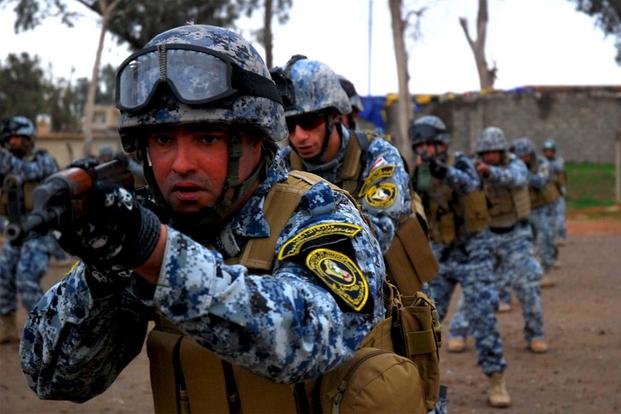The U.S. has funded a $50 million "Police in a Box" plan to set up local and border security on-the-fly in areas cleared of ISIS, a coalition general said Thursday.
A "milestone" in the development of the plan was reached earlier this week when the first of the projected 100 "boxes" was delivered to the Iraqi Interior Ministry, said Canadian Brig. Gen. D.J. Anderson.
The goal was to enable the Iraqis to set up "temporary stations that provide a local police force with the equipment necessary to establish themselves in areas where ISIS (Islamic State of Iraq and Syria) has destroyed their infrastructure," Anderson said in a video briefing from Baghdad to the Pentagon.
The "box" is a large shipping container packed with a tent for working space, furniture, lighting, water tanks, laptops, phones, GPS, weapons storage spaces and two vehicles -- "in essence everything they need to set up a visible presence and immediately begin serving their citizens," Anderson said. "The contents can be unpacked and set up quickly."
He said the boxes would begin to be delivered later this summer across Kirkuk, Saladin, Diyala, Anbar and Nineweh (including Mosul) provinces. The local police plan would be followed by a similar "Border Guard in a Box" project which will also include a small tower for observation, Anderson said.
"Nothing says normal like a policeman," Anderson said, but under current conditions "there's no place for them to go to set up." The boxes were meant to give them that ability.
The plan was to have 50 boxes for the local police and another 50 for the border guards. The total cost of the project would be about $50 million, which will come out of the U.S. Iraqi Training and Equipment Fund, said Anderson, director of partner force development and the Ministerial Liaison Team for Combined Joint Task Force-Operation Inherent Resolve.
Anderson said the box concept grew out of workshops organized by the Ministerial Liaison Team in the training of about 15,000 Iraqi police by the Royal Canadian Mounted Police and the Italian Carabinieri (military police). The final plan was the work of 13 colonels from eight coalition countries, he said.
Anderson said the box plan was evidence that the coalition was working with the Iraqis to establish stability after the defeat of ISIS, contrary to recent criticism that little was being done to prevent another descent into the sectarian and tribal rivalries that gave space to the rise of the so-called "caliphate."
In a paper for the Raddington Report, Emma Sky, an author and advisor to former Army Chief of Staff Gen. Ray Odierno, said that ISIS "is likely to lose hold of all its territory in the country by the end of this year" but "celebrations at the demise of the caliphate in Iraq may well be short-lived."
"A loose coalition of forces found a common objective in working together to fight ISIS, but there is no agreement on what comes next -- nor on how Iraq should be governed. And the signs are worrying: there seems to be little willingness to address the conditions that gave rise to ISIS in the first place."
However, Anderson pointed to efforts by the Iraqis in East Mosul, where local security has been established to allow residents to return to their homes even as fighting continued in West Mosul.
In West Mosul, on "Day 137" of the offensive to retake Iraq's second-largest city, ISIS' grip had been reduced to an area equivalent to about one city block on the Tigris River and the last remnants of the ISIS fighters were under constant air and ground attack, according to Anderson and Pentagon officials.
ISIS was "certainly on its last legs in Mosul and elsewhere," Anderson said, and the U.S. and the coalition were committed long-term to Iraq's stability after the defeat of ISIS. "How long will we be here? We'll be here as long as we need to be here," said Anderson, who was wrapping up his own 14-month tour in Iraq.
-- Richard Sisk can be reached at richard.sisk@military.com



























